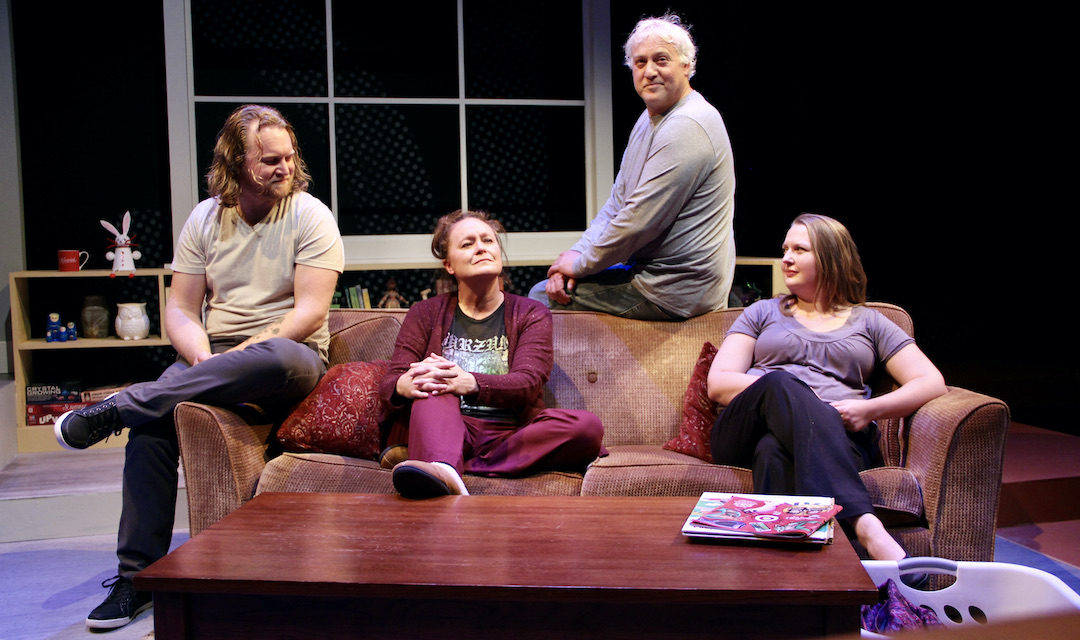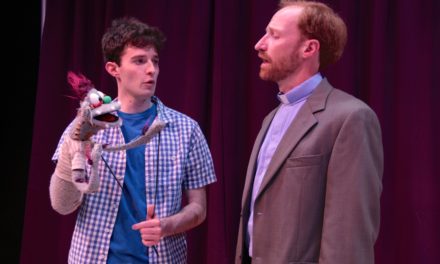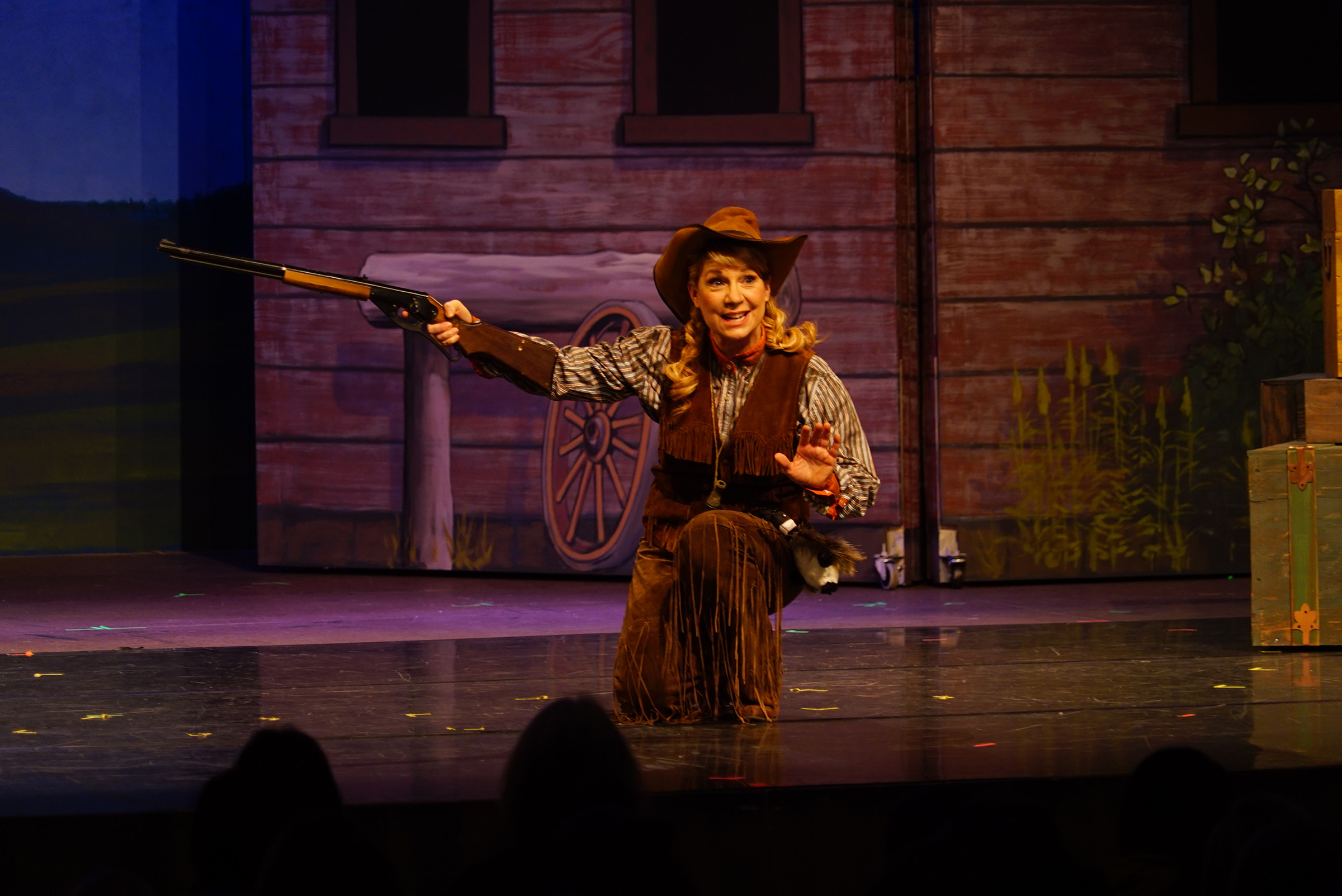(Above: Eric Braman, Tracy Nygard, Patrick Dizney & Chelsey Megli play in Oregon Contemporary Theatre’s production of Tiny Beautiful Things.)
By Kelly Oristano
Tiny Beautiful Things, now onstage at Oregon Contemporary Theatre, is a whirlwind, possibly even whiplash, return to the magic of live in-person theater. Based on the book by Cheryl Strayed, adapted for the stage by Nia Vardalos, and directed here by Inga Wilson, the play dramatizes Strayed’s stint as Sugar, an anonymous online advice columnist.
The play largely takes the form of call-and-response, as three Letter Writers (Patrick Dizney, Chelsey Megli, and Eric Braman) assume countless characters presenting many dozens of Dear Sugar letters to Sugar (played by Tracy Nygard) and the audience. Eventually, follow-up questions are asked and deeper answers given, deftly avoiding a One Letter/One Response formula.
Sometimes Sugar answers quickly; sometimes she refuses to answer with a “you should know better” look; sometimes the letters make her laugh; sometimes they catch her off guard. As the play evolves, all the letters bring her back to herself, to her own whirlwind, possibly even whiplash, personal history.
After an initial deluge, the letters come in matching batches. There’s a batch of young readers whose problems and the advice they seek are almost charmingly naive, but Sugar meets them where they are and earns their and our respect. Later there’s a clutch from various husbands and wives who all seek advice or absolution for crushing, fantasizing, or even stepping outside the marriage, or for wanting to leave it without a good reason. Late in the play there’s a swirl of letters from people using the anonymity of their pseudonyms to confess darker secrets. The universal shame of being ‘The Only One Who…” and other deep regrets and scarring traumas.
But in and amongst these are a handful of singular letters. Letters that knock Sugar back on her heels. Each of the three Letter Writers has at least one Very Serious Letter which gets more of Sugar’s (and our) focus than the rest. These letters are the heart (and other chakras) of the play, so we won’t explore them here. But it’s this narrative device that brings to mind the terms whirlwind and whiplash. Most of the Very Serious Letters describe stories that could be their own full plays, and rich and interesting ones at that. Instead, we experience them in short intense flashes designed to serve Vardalos’ and Strayed’s intended story.
It’s an engaging story with a resonant core about growth and forgiveness. Sugar stands out as an advice columnist because she almost isn’t one. She never holds herself out as an expert or a paragon of virtue, she leads with her own “brokenness,”and her “best advice’” is usually a devastating story about her own broken past — but also how she’s okay now, even if she’s not wonderful or perfect. Most of the letters seek a form of absolution. “Can I feel this way?” “Can I do this thing?” “Can I live with myself after breaking my self-concept?”
Slowly, over the evening, Sugar lets the personal become public. What we all — Sugar, Letter Writers, and Audience — come to realize is that what everyone’s been seeking is not absolution from an anonymous broken person, but rather permission to forgive themselves. Sugar will grant this permission in great abundance. This is her unique message to the world. Hell yes, forgive yourself. Do it a hundred times a day. Forgive what you’ve already done, forgive what you almost certainly will do moving forward. How could you possibly move forward otherwise? She has a fantastic line about forgiveness being the way toward — “unification of the once and future parts of me” — that will stick with this reviewer for a long time.
The production is a great success for all departments, and the magic of full buy-in and collaboration from all corners shines through every detail of Inga Wilson’s direction. A distinct warm tone pervades the set, the light, the wardrobe, the props, the music and sound, and from the moment they enter, the cast.
Dizney, Megli and Braman are up to every challenge of playing dozens of characters in dozens of ways. Chelsey Megli displays profound versatility in moving between comedy and tragedy repeatedly, with brilliant colors in between. Eric Braman can be bold and hilarious, and then tender and desperate for love in the space of seconds. Patrick Dizney’s letter writer serves as something of a counterweight, both in vocal character and as a matter of plot. Early on his sarcasm resonates, and then his seriousness resonates even more, and when the character presents his Very Serious Letter toward the end, he creates a special moment that powerfully shifts the energy in the room.
Tracy Nygard is a fully realized and well-drawn Sugar. This Sugar knows who she is, she knows who she isn’t, and she knows that there’s a lot she doesn’t know about herself yet. The performance amazes by going so many places while staying totally grounded at every instant. Nia Vardalos, who wrote and also performed the role, asks a lot of the actor who plays Sugar. Nygard honors and meets that challenge squarely, with a deep and honest connection to a completely human character.
Jeffery Cook’s set is a warm, inviting, split level home that feels genuinely lived in, thanks to lots of special touches from prop designer Zoë Pouliot. Before the show begins we can learn volumes about Sugar from what we see onstage. The lighting design by Emily Bolivar is subtle, but gives a morning/noon/night feel that helps the audience know “where we are” in the play, and enhances the warm mood. DeMara Cabrera’s wardrobe looks so comfy and real that one might believe the actors just walked onstage in whatever made them feel good. Some letters are enhanced with a single extra wardrobe piece, always to nice effect.
Tiny Beautiful Things runs through November 28, so please forgive yourself what’s likely been a two-year absence from the theatre, go sit in the dark with a bunch of (vaccinated) people, and watch these professional artists make magic happen.
Tiny Beautiful Things at Oregon Contemporary Theatre
When: 7:30 p.m. on November 18-20 and 26 -27; 2:00 p.m. on November 21 and 28
Where: Oregon Contemporary Theatre, 194 W Broadway; Eugene
Tickets: $20-$44, available at the ticket office, 541-465-1506, or online at octheatre.org
Information: 541-684-6988 (administrative office) or online at octheatre.org
Covid details:
- Face masks are required at all times at OCT, including while watching a performance.
- Proof of vaccination: Upon entry, patrons must show proof of full COVID-19 vaccination OR proof of a negative COVID-19 test within 48 hours of the date of the performance. Patrons can show either paper or digital documentation (including a photo of your vaccination card), along with a matching photo ID.
- “Full COVID-19 vaccination” means 14 days after a single-dose vaccine or 14 days after the final dose in a two-dose vaccine series. Vaccination cards and/or test results must be from a licensed provider, laboratory, or health care provider. Self-reported vaccination records or at-home test results not verified by a health care provider cannot be accepted.
- Actors are fully vaccinated but will only be unmasked while performing.
- No concessions will be sold until further notice.









